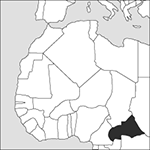
Source: MAPS IN MINUTES™ © RH Publications (1997)
Capital:
Bangui
Area:
622,984 sq km (240,535 sq miles)
Population:
5,166,510 (2012 est)
Currency:
1 CFA franc = 100 centimes
Religions:
traditional beliefs 35.0%; Protestant 25.0%; Roman Catholic 25.0%; Muslim 15.0%
Ethnic Groups:
Baya 33.0%; Banda 27.0%; Mandjia 13.0%; Sara 10%; Mboum 7%
Languages:
French (official); Sango; Baya; Banda; local languages
International Organizations:
UN; AU; Non-Aligned Movement; Franc Zone; WTO
A landlocked country in Africa stretching west-to-east from Cameroon to the Sudan and south-to-north from humid equatorial forests bordering the Democratic Republic of Congo to the savannah plains of the Chad basin.
Physical
The country mainly comprises low plateaux, with the highest point at 1420 m (4660 feet) in the west. The Oubangi River forms the southern boundary and is an important channel of communication.
Economy
The Central African Republic is one of Africa’s poorer countries, with a largely agricultural economy. There are export crops of coffee, cotton, and hardwood timber. Timber, followed by diamonds and cotton, constitute the largest export commodity; some gold is mined.
History
Archaeological finds have shown that the area was inhabited from palaeolithic times (from about three million years ago), but there are no documentary records until the 19th century. The Central African Republic is thought to have been part of the empire of Gaoga, which flourished in the 16th century, and the region was raided for slaves during the 16th, 17th, and 18th centuries. The French began exploring the country in 1889 and by 1911 had taken full control of it. As the French colony of Ubangi Shari, it formed part of French Equatorial Africa. In 1958 it became a republic within the French Community, and fully independent in 1960. In 1976 its President, Jean Bedel Bokassa, declared it an empire, and himself Emperor. Following allegations of atrocities, he was deposed in 1979, and the country reverted to a republic. Political instability persisted, and in 1981 General Kolingba seized power from the civilian government. This was restored in 1986 with Kolingba still President. There were demands for multiparty politics, and a new constitution was adopted in 1992. Elections were held in 1993: Ange-Félix Patassé became President and a coalition government was formed. Patassé was re-elected in 1999. A military coup in 2003 installed General François Bozizé as President. Elections held in 2005 confirmed Bozizé in office and he was re-elected in 2011. His term of office saw conflict with domestic rebel forces and incursions arising from conflicts in neighbouring countries. A ceasefire between government and mainly Muslim rebel forces in 2013 quickly broke down. The rebels occupied the capital, Bozizé fled, and a rebel leader, Michel Djotodia, became President. However, Djotodia could not control his forces, which continued to provoke conflict with the predominantly Christian population. International pressure forced Djotodia to resign in 2014; he was succeeded by Catherine Samba-Panza, former major of Bangui. 12,000 UN peacekeepers were deployed in April 2014 to stem the continuing violence.
Presidential and parliamentary elections were finally held in December 2015, but the parliamentary elections were declared fraudulent and annulled. The run-off election for president, held in February 2016, was won by Faustin Archange Toudéra, a former prime minister. Parliamentary elections were completed in April, with nearly half of those elected being independent of any political grouping. The crisis has led to around 400,000 people being displaced within the country with a further 460,000 fleeing to neighbouring countries.
- genus
- genus-zone
- GEO
- geo
- geo-
- geobarometer
- geobotanical anomaly
- geobotanical exploration
- geocache
- geocaching
- geocentric
- Geocentric Celestial Reference System
- geocentric coordinates
- Geocentric Coordinate Time
- geocentric equatorial parallax
- geocentric parallax
- geocentric universe
- geochemical affinity
- geochemical anomaly
- geochemical cycle
- geochemical differentiation
- geochemical soil survey
- geochemistry
- geochronologic unit
- geochronology